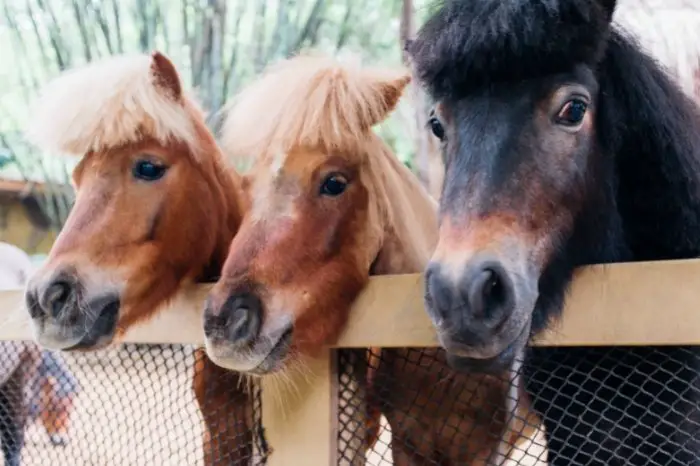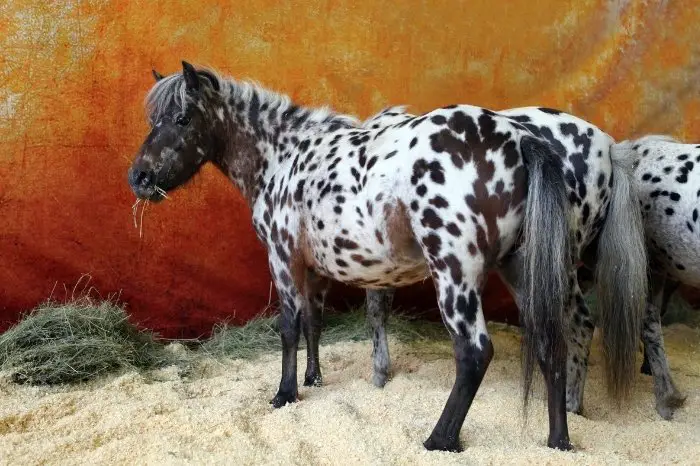Last Updated on February 23, 2022
Horses come in all sorts of shapes and sizes, and there are many different types of ponies originating from all around the world.
Let’s take an in-depth look at the different types of ponies, and see what they are all used for!
Why Are There So Many Different Types Of Ponies?
Horses were first domesticated by humans over 5 thousand years ago, and have been a part of our lives ever since. These versatile animals have lived alongside people, assisting them with their daily lives and helping to carry out a huge range of tasks and activities. Over time, humans have shaped the appearance and characteristics of horses, to create many different breeds and types.
This was achieved by a process called selective breeding, where animals were bred together to enhance or remove certain traits. For example, a farmer may have wanted a strong horse to pull his plow, so would pick his best working mare to breed with the strongest stallion in the area. This meant that the characteristics of wild horses were gradually changed to make them more suitable for our needs.

It is this exact same process that has created the many different types of ponies we know and love today. The only real difference is, that when it comes to ponies, many breeds have retained the characteristics that helped them to survive in their own particular location.
A good example of this is to look at the native ponies of the British Isles. There are nine native breeds of pony originating from Britain, each with its own very specific set of traits and characteristics. However, one thing they all have in common is the ability to survive in cold, harsh weather, and they are all sure-footed over rough terrain.
Interestingly, many centuries ago the overall size of horses was much smaller, and ponies were much more commonly used than horses. Most native and wild breeds of horses were pony-sized, and it is only through selective breeding that we have so many horse breeds today. It is hard to imagine, but the horses used in battle in the Middle Ages were actually much more likely to have been ponies!
Read more about Short Horse Mane Care – How To Create A Beautiful Mane!
Best Types Of Pony That Are Easy To Look After
If you want a pony that is low-maintenance, the best place to start is by finding a breed that is native to the area that you live in. Alternatively, you can look for a type of pony that is adapted to survive in a similar climate to your own.
Now, all ponies require some looking after, so no matter what type you get it will need some care and attention! But by finding a breed of pony that suits your local climate, it will be better adapted to survive and thrive.
The Encyclopedia of Horses Ponies
Best Pony Breeds For Cold Climates
There are many different types of ponies that are able to cope in climates with cold, wet weather. These pony types will have thick, dense coats, able to keep them warm and dry. They will also be ‘good doers’, meaning they need fewer calories to survive.
A pony breed from hot climates will need a lot of nurturing during colder weather, with additional rugs and increased amounts of feed. A cold-blooded pony breed has very low maintenance needs during the winter, as long as they have shelter from the rain and a good supply of hay. Their thickset bodies are better able to retain heat and body warmth.
These pony breeds are all well adapted to survive in colder climates:
- Icelandic Pony
- Shetland Pony
- Dales Pony
- Highland Pony
- Haflinger Pony
Best Pony Breeds For Hot Climates
At the opposite end of the scale, ponies from warmer countries have fine, sleek coats and are better able to cope with warm weather. They can withstand higher temperatures without the need to have their hair clipped. These ponies tend to be finer in build than cold-blooded pony breeds.
- Pony Of The Americas
- American Quarter Horse
- Rocky Mountain Horse
- American Sports Pony
- Falabella Pony

Best Pony Breeds For Children And Novice Riders
If you are learning to ride or looking for a first pony for your child, you will want a breed that is calm and sensible. The ideal pony for a beginner is one that is well-behaved and that can be trusted not to take advantage of an inexperienced jockey.
All ponies need some expert supervision around young and inexperienced riders, but some different types of ponies tend to be more trustworthy and steadier than others.
Here are some good breeds of ponies for children and novice riders:
- Welsh Mountain Pony
- Fell Pony
- Connemara Pony
- Paint Horse
- Shetland Pony
Check Out What Does A Minimal Splash Horse Look Like?
Best Type Of Pony For Competitions
A young rider can quickly progress, and you may find yourself looking for a pony that has more athletic ability than your first pony. For competitions, you will need a pony that is quick and responsive to your commands, and one that approaches each task with enthusiasm and vigor.
The type of pony you need for competitions will depend on the sort of event you want to enter. Generally speaking, ponies with a fine build tend to be more athletic than thick-set breeds, and can often jump higher and run faster. The sturdier breeds of pony are more suited to competitions that require endurance and stamina.
These breeds of pony are all highly sought after for competitions:
- Appaloosa
- Connemara
- Quarter Horse
- American Sports Pony
- Welsh Cob
Different Types Of Ponies Summary
So, as we have learned, there are many different types of ponies, with breeds to suit the requirements of all types of horse owners and riders. Around the world, ponies have been bred to enhance specific characteristics, such as a calm nature, the ability to survive in cold weather, or high levels of endurance. We all have our favorite pony breeds, so it would be hard to decide which one is the best!
We’d love to hear your thoughts on the different types and breeds of ponies. Do you have a particular favorite breed? Or perhaps you’re struggling to decide what type of pony to buy? Leave a comment below and we’ll get back to you!

Kate Chalmers is a qualified veterinary nurse who has specialized in horse care for the vast majority of her career. She has been around horses since she was a child, starting out riding ponies and helping out at the local stables before going on to college to study Horse Care & Management. She has backed and trained many horses during her lifetime and competed in various equestrian sports at different levels.
After Kate qualified as a veterinary nurse, she provided nursing care to the patients of a large equine veterinary hospital for many years. She then went on to teach horse care and veterinary nursing at one of the top colleges in the country. This has led to an in-depth knowledge of the care needs of horses and their various medical ailments, as well as a life-long passion for educating horse owners on how to provide the best possible care for their four-legged friends.
Kate Chalmers BSc (Hons) CVN, Dip AVN (Equine) Dip HE CVN EVN VN A1 PGCE

